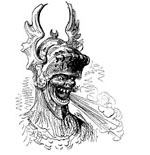
The Variety & Theological Implications of Private Revelations
THE ODD CASE OF ADRIENNE VON SPEYR -- PART II
Ed. Note: The first of this two-part series appeared in our October issue.
There have, of course, been many genuine supernatural miracles and revelations in Christian history. On the other hand, in our discussion of the sometimes impactful paranormal (or, more properly, preternatural) experiences many spiritually confused or diabolically assailed individuals have undergone throughout history, we have highlighted the prominent but controversial case of the alleged mystic and seer Adrienne von Speyr (1902-1967), a convert to Catholicism. We have seen how her personal history and collaboration with the theologian Hans Urs von Balthasar (secretive during her lifetime) involved a number of highly questionable phenomena. These included, prominently, a preoccupation, on both their parts, with particular theological interests (e.g., Hell and the demonic, highly speculative Trinitarian notions, and certain esoterica); “working” practices strikingly similar to those of conventional spiritualism (e.g., channeling and summoning of spirits); and occurrences with close parallels to ones long recognized as characteristically, even classically, preternatural or “pseudo-mystical” in nature (e.g., bilocation and levitation).
As noted, true spiritual experts have never concluded that such alleged “gifts” are necessarily supernatural, as Speyr and Balthasar, it appears, uncritically assumed of hers. It has long been recognized, however, that these supposed “charisms,” albeit thought popularly as exclusive of the saintly, are frequently diabolic tricks.
Further, and even more disturbingly, Balthasar himself noted a “strange, deep voice” that emerged from Speyr on several occasions. This “voice,” speaking through her, was suspiciously vituperative and otherwise odd and revealing in certain motivated pronouncements, for instance, during her “Catholic baptism” when she appeared reluctant to affirm the Tridentine extra ecclesia, nulla salus (“Outside the Church there is no salvation”) formula. In his book Our Task (1980) Balthasar explicitly describes the voice as speaking with “an ice-cold severity” and “not her own voice. Someone else is speaking out of her…. A terrifying indictment continues for almost an hour.”
That observation, alongside Speyr’s forgetting her “voice” and “revelations” immediately after coming out of her “trance” states, suggests not a dissociative disorder, another common alternative theory, but the diabolic hypothesis, including some level of direct control by an evil spirit, if only intermittently. Though Speyr was not possessed, this sort of voicing is characteristic of what’s heard in many serious diabolic states, including routinely in genuine possessions.
You May Also Enjoy
How can the Christian suffer as Christ suffered if he is airlifted off the face of the earth before he can undergo the most severe kind of suffering (the "tribulation")?
Feminist Sister of Mercy Margaret Farley, who has taught ethics for three decades at Yale, defends the entire gamut of sexual activity outside of marriage.
The practice of abortion as a Satanic ritual is confirmed in a disturbing interview with a former leader of the Church of Satan.

